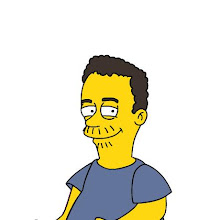I was involved in 2 cases last night where river bet sizing took an important role.
The first was a Holdem hand. Tony raised on the button. I sat in the big blind with Ace-Ten offsuit: a tad too weak to defend with (don't tell the other players in my game who defend their blinds like parents defend children), but at the top of my folding range. These are good hands to turn into semibluff 3bets. Tony will fold small pairs and broadways with 40%+ equity against me, and I will profit.
Or, he'll take advantage of his position and play a big pot with advantage. He flats, and we see a Queen-nine-nine flop.
I'm pretty much done with the hand. The queen misses me and hits his range well enough. Can't very well represent a nine in a three-bet pot. Tony is sticky with pairs and this flop won't scare him too much - he'll probably float a cbet and leave me in the same position I'm in now on the turn, except with less money in my stack. I check.
Tony checks behind, giving me enough credit for the possibility of a checkraise.
The turn is interesting - a third nine. Our relative hand strength hasn't changed, I'm still done with the hand. I check, and Tony checks again. I've got him on a small pair now, or Ace-King. I don't beat any of it.
But the river changes this. A ten gives me a strange nines full of tens full house. I think I've just caught his ace-king and spiked over all his pairs. A value bet is in order, but Tony isn't calling a very big bet here. The bet size has to be small enough for pocket sixes to call, as well as ace high, king kicker. His range is very weak overall, but he can beat bluffs, and I have to try and eek a bluff-beating call from him.
I bet an even $10, into a pot of $24. Less than half pot. This should feel like a weak stab to him. He calls pretty quickly.
"I hit the ten", I say as I start to roll over my hand.
"Pocket Jacks", Tony replies, surprising me. Maybe the one hand that beats me that I could see being played this way.
"That was a nice blocking bet", he tells me. "If you checked the river, I would have bet much bigger".
"It wasn't meant to be a blocking bet, it was meant to be a value bet against every other hand you could possibly be holding", I laughed. But it did work out for me like a blocking bet, and I escaped my bluff-gone-not-quite-right without too much damage.
A similar situation happened later, in an Omaha hand. I ended up with the second nut flush, a queen high heart flush on a board with three hearts and 2 aces. I had two opponents in the hand. This time, I was much less sure of a winner, as is often true in Omaha, but I knew a small bet would get smaller flushes and trip aces to call me and I could squeeze a bit of value out. Furthermore, I could virtually never get raised by anything but a full house - the king high flush would be afraid of full houses himself, as would trip aces. A raise would bring an no-brainer fold.
My bet was $20 this time, but into biggish $100 pot. It was the correct size for what I was trying to accomplish. Value against weakish flushes and trip aces, blocking bets against the nut flush and full houses. Both players called me, and I was knew I was not winning the pot this time, as the king high flush dragged the chips his way. But again I mitigated severe damage.
1 year ago

No comments:
Post a Comment